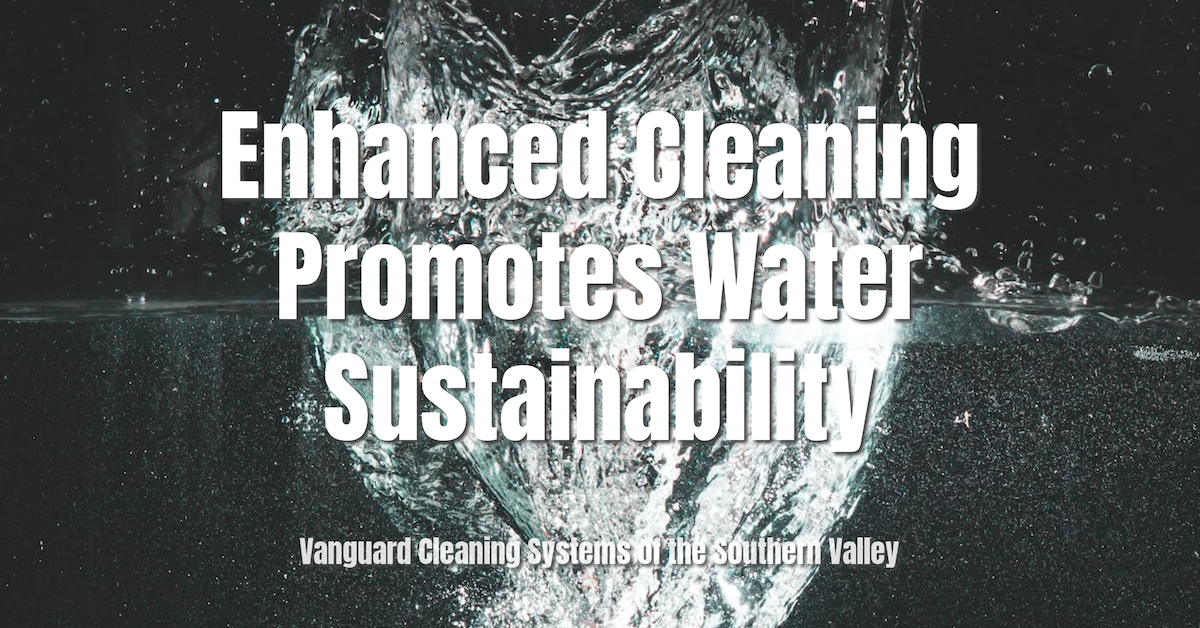Adopting best practices for improved cleaning methods, including eco-friendly cleaning products and optimized cleaning schedules, is essential for promoting environmental sustainability and reducing the environmental impact of cleaning practices.

Reducing Water Use, Waste, and Pollution
Reducing water use, waste, and pollution is essential for several reasons:
- Overusing water resources contributes to a global water crisis, with many regions facing severe water scarcity.
- Waste generation and disposal are significant environmental problems that contribute to land, water, and air pollution and the depletion of natural resources.
- Pollution significantly impacts human health and the environment, causing respiratory problems, skin irritation, and other health issues.
Reducing water use, waste, and pollution through improved cleaning methods and technologies can help mitigate these problems and promote a more sustainable future.
The Water Footprint
The water footprint measures the total amount of water used in producing goods and services, including the water used in manufacturing, agriculture, and other upstream processes.
The water footprint can also be used to measure the water used in the cleaning process.
Understanding the water footprint is vital for several reasons:
- Cleaning can be water-intensive, with large volumes of water used for tasks such as mopping floors, washing windows, and cleaning restrooms.
- The water used in the cleaning process is often treated as wastewater, which can contribute to water pollution and contamination of natural water resources.
- The production of cleaning products can also be water-intensive, further contributing to the overall water footprint.
By understanding the water footprint of cleaning practices, we can identify opportunities to reduce water use and pollution.
This may involve adopting more water-efficient cleaning methods, such as low-flow or high-pressure cleaning technologies or cleaning products requiring less water.
It may also involve choosing cleaning products that have a lower water footprint, such as those that are concentrated or require less water in their production.
Understanding and Reducing Waste
The overuse and inefficient use of water resources can contribute to a range of environmental problems, including:
- Water scarcity - Overusing water resources can lead to water scarcity, a major global issue affecting many regions worldwide. Water scarcity can lead to drought, crop failure, and other severe environmental and economic problems.
- Habitat destruction - The diversion of water resources for human use can destroy natural habitats, negatively impacting biodiversity and ecosystem functioning.
- Energy consumption - The treatment and transportation of water consume energy, contributing to greenhouse gas emissions and climate change.
- Water pollution - Overusing water resources can lead to the depletion of natural resources and groundwater and surface water contamination, affecting aquatic life and human health.
There are several methods for reducing water waste that can be adopted in cleaning practices, including:
- Water-efficient cleaning methods - Using cleaning methods that require less water, such as low-flow or high-pressure cleaning technologies, can help reduce water waste in cleaning practices. Adopting practices such as pre-soaking or spot cleaning can also help reduce water usage.
- Fixing leaks and repairing faulty equipment - Leaks and faulty equipment, such as faucets and toilets, can contribute to significant water waste over time. Regular maintenance and repair of equipment can help reduce water waste.
- Water recycling and reuse - Using recycled or greywater (untreated wastewater from sinks, showers, and other household sources) for cleaning can help reduce freshwater use. Capturing and reusing rainwater or other alternative sources can also help reduce water waste.
- Education and awareness - Educating staff and customers about the importance of water conservation and how to adopt water-efficient cleaning practices can help reduce water waste and promote more sustainable cleaning practices.
Best Practices for Improved Cleaning Methods
Adopting best practices for improved cleaning methods is essential for promoting environmental sustainability and reducing the environmental impact of cleaning practices.
- Use eco-friendly cleaning products - Use cleaning products that are biodegradable, non-toxic, and made from natural ingredients. Avoid using cleaning products that contain harmful chemicals such as bleach, ammonia, or phosphates, which can be detrimental to human health and the environment.
- Use microfiber cleaning cloths - Use microfiber cleaning cloths, which are highly effective at removing dirt and grime without the need for excessive water usage. Microfiber cloths are also reusable, making them a more sustainable option than disposable cleaning wipes.
- Adopt green cleaning methods - Adopt green cleaning methods such as steam cleaning, dry cleaning, and ionized water cleaning. These methods are highly effective for cleaning using less water and fewer harmful chemicals.
- Optimize cleaning schedules - Optimize cleaning schedules to reduce the frequency of cleaning and avoid over-cleaning. This can help reduce the amount of cleaning products and water used and reduce the environmental impact of cleaning practices.
- Educate staff and customers - Educate staff and customers about the importance of environmental sustainability and the impact of cleaning practices on the environment. Provide training on eco-friendly cleaning practices and encourage staff and customers to adopt more sustainable cleaning habits.
Takeaway
Adopting sustainable cleaning practices is crucial for promoting environmental sustainability and reducing the environmental impact of cleaning practices.
By prioritizing methods that conserve water, reduce waste, and promote eco-friendly cleaning products and technologies, we can help protect the environment and promote a healthier planet.
We are responsible for prioritizing sustainable cleaning practices in our homes, businesses, and communities to ensure that we leave a cleaner, greener planet for future generations.
Outsourcing is a proven method for onboarding highly in-demand cleaning and disinfection services and experience for a fraction of the price of maintaining a similar service in-house.
If you would like more information regarding the effectiveness of high-performance infection prevention and control measures, or if you would like to schedule a free, no-obligation on-site assessment of your facility's custodial needs, contact us today for a free quote!
In Bakersfield, CA, call (661) 437-3253
In Fresno, CA, call (559) 206-1059
In Valencia, CA, or Santa Clarita, CA, call (661) 437-3253
In Palmdale, CA, or Lancaster, CA, call (661) 371-4756

